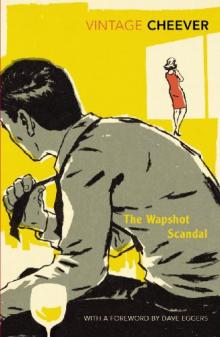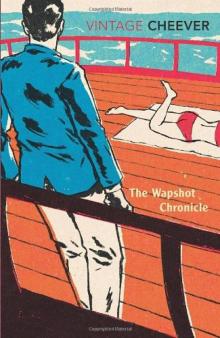- Home
- John Cheever
The Journals of John Cheever Page 2
The Journals of John Cheever Read online
Page 2
•
Awake before dawn, feeling tired and full of resolutions. Do not drink. Do not et cetera, et cetera. The noise of birdsong swelling: flickers, chickadees, cardinals. Then in the midst of this loud noise I thought I heard a parrot. “Prolly want a crackeer,” he said. “Prolly want a crackeer.” Woke tired and took the 7:44. The river blanketed with a mist. The voices overheard. “Well, then she boiled it and then she broiled it.” He raised his face and drew over it a beatific look as if he were tasting last night’s dinner again. “Well, we’ve got one of those electric rotisseries.” “Oh, New York’s nothing like Chicago; nothing like it.” On Twenty-third Street I read a sign: “DON’T LOSE YOUR LOVED ONE BECAUSE OF UGLY FAT.” There was a window full of crucifixes made out of plastic. The surface of the city is paradoxical. For a mind cast in paradox it is reassuring to find this surface. Thinking again, in the dentist’s chair, that I am like a prisoner who is trying to escape from jail by the wrong route. For all one knows, that door may stand open, although I continue to dig a tunnel with a teaspoon. Oh, I think, if I could only taste a little success. But don’t I approach it by deepening the pit in which I stand? Mary in the morning, asleep, looking like the girl I fell in love with. Her round arms lie outside the covers. Her brown hair is loose. The abiding quality of seriousness and pureness.
•
In the dark hour you cannot call on goods and chattels to save you, or old ski trails or the paths to streams. You must find something greater. And the mind in which the forces of contumely and destruction seem greater than the forces of creativity. Creativity is there, but it seem, in relation to the forces of destruction, like the nipple on a balloon. So, made up of so much destruction and with such a slender knowledge of love he appears poorly as a husband, son, and lover—masked in a rag of a smile and a striped tie and a few faint observations. Oh so deeply rooted in this mind are the needs and the habits of prayer. Having triumphantly separated himself from the foolishness of religion, he goes by the church—he hears the bells in the morning—in the churlish and unhappy frame of mind of a man who has been excommunicated. He feels the lash of expulsion. And oh this poor mind, casting desperately around a room for some detail that will give it form and meaning, seizes always on an ashtray heaped with butts or a crooked stocking, a tear in the rug. And then he sees the sky! the poignant blue, the line of darkness rising like a lid; the perfect clearness of line and color that means that a northwest wind has scoured the overcast and blown it out to sea. So his mind wanders between the ashtray and the twilight while most of the known world lies somewhere in between. He worries, he worries about his mustache, his old navy raincoat, his weight, his hair, his teeth, the stiffness in his left knee, and if his anxiety ever transcends this it is to worry about a nation of paltry men, conceived in his image and likeness—or, if he is a world federalist, to worry about a world. Why has the sweetness gone? It would all come back with a new car or a bonus or a little of the recognition that he deserves for his hard work. A convertible; a trip to Spain.
•
The stubborn dreariness of this rainy Sunday. Down at the station there are only a few travellers for the southbound local. A cook with a paper bag full of leftovers and a hand-me-down coat is going to Yonkers to visit her relations. A maiden aunt out for Sunday lunch is returning. The last is a figure of mystery, a man in a worn polo coat beneath which show the striped pants and boiled shirt of a tuxedo. These are the only passengers and they seem to have come here unwilling to catch a train and make a hopeless journey. In the waiting room and the cabstand, both of them unattended, a telephone rings and rings and rings. Fishnets for shad and bass are strung out into the water, and the rain, like a much finer net, encircles the county with a stir of reassuring and dreary noise. Racks of string hang above the railroad track like the old-fashioned fly nets worn by livery horses. It is a stubborn and an infinite drearines, rooted in the stupor, the discomfort, or the downright misery of a heavy churchgoer’s lunch. The ballgame has been rained out but not the “Emperor” Concerto or the “Jupiter” Symphony. More than half the world is in an unrefreshing sleep.
But between the waiting room and the freight house there is a view of water and mountains. The eye goes up for miles and miles, for while the little rain makes the shore dim, nothing is obscured. Here there is more power and space than you had expected. The smudge from a distant tugboat, discouraged and scattered by the little rain, drifts toward the water. There is a mountain as round as a plump knee and a mountain cut like a cock’s crest and even a faint smell of the wilderness—dead bloodworms and wet corduroy—for three fishermen are strung along the narrow bank between the railroad tracks and the water. Oh it is so dreary that one’s teeth seem literally to ache. The smell of boiled beef lingers in the upstairs hall.
•
As I approach my fortieth birthday without having accomplished any one of the things I intended to accomplish—without ever having achieved the deep creativity that I have worked toward for all this time—I feel that I take a minor, an obscure, a dim position that is not my destiny but that is my fault, as if I had lacked, somewhere along the line, the wit and courage to contain myself competently within the shapes at hand. I think of Leander and all the others. It is not that these are stories of failure; that is not what is frightening. It is that they are dull annals; that they are of no import; that Leander, walking in the garden at dusk in the throes of a violent passion, is of no importance to anyone. It does not matter. It does not matter.…
•
In town for lunch. The air-conditioning, the smell of perfume and gin, the attentions of the headwaiter, the real and unreal sense of haste, importance, and freedom that clings to the theatre. It was a beautiful day in town, windy, clear, and fresh. The girls on the street are a joy. A girl with bare arms by the St. Regis; a girl with bare shoulders on Fifty-seventh Street; dark eyes and light eyes and red hair and above all the wonderful sense of dignity and purpose in their clear features. But there is the imperfect joining of the carnal world and the world of courage and other spiritual matters. I seem, after half a lifetime, to have made no progress, unless resignation is progress. There is the erotic hour of waking, which is like birth. There is the light or the rainfall, some ingenuous symbol by which one returns to the visible, perhaps the mature world. There is the euphoria, the sense that life is no more than it appears to be, light and water and trees and pleasant people that can be brought crashing down by a neck, a hand, an obscenity written on a toilet door. There is always, somewhere, this hint of aberrant carnality. The worst of it is that it seems labyrinthine; I come back again and again to the image of a naked prisoner in an unlocked cell, and to tell the truth I don’t know how he will escape. Death figures here, the unwillingness to live. Many of these shapes seem like the shapes of death; one approaches them with the same amorousness, the same sense of terrible dread. I say to myself that the body can be washed clean of any indulgence; the only sin is despair, but I speak meaninglessly in my own case. Chasteness is real; the morning adjures one to be chaste. Chasteness is waking. I could not wash the obscenity off myself. But in all this thinking there is a lack of space, of latitude, of light and humor. Thinking back to “The Reasonable Music,” it seems to me, for this reason, to be a bad, a febrile, story. Play a little baseball and the Gordian knot crumbles into dust.
•
Is there anything more wonderful than the Monday morning train: the 8:22? The weekend—say a long summer weekend like the Fourth—has left you rested. There have been picnics, fireworks, excursions to the beach—all the pleasant things we do together. On Sunday we had cocktails late and a pickup supper in the garden. We see the darkness end the weekend without any regret—it has all been so pleasant. In the garden we can hear, from the west, the noise of traffic on the parkway rise to a high pitch that it will hold until nearly midnight, as other families drive back to the city from the mountains or the shore; and the sleeping children, the clothing hung in the backseat, the in
finity of headlights—the sense we take from these overcrowded Sunday roads of a gigantic evacuation, a gigantic pilgrimage—is all a part of this hour. You water the grass, tell the children a story, take a bath, and get into bed. The morning is brilliant and fresh. Your wife drives you to the train in the convertible. The children and the dog come along. From the minute you wake up you seem to be on the verge of an irrepressible joy. The drive down Alewives Lane to the station seems triumphal, and when you see the station below you and the trees and the few people who have already gathered there, waiting in the morning sun, and when you kiss your wife and your children goodbye and give the dog’s ears a scratch and say good morning all around the platform and unfold the Tribune and hear the train, the 8:22, coming down the tracks, it seems to me a wonderful thing.
•
Concerned over my brother. A man who conveys a feeling of deep perplexity. Things have not turned out the way he meant them to. The way he speaks and looks, the mind that strikes almost always idly or in self-defense, the way he pares his fingernails and wipes his mouth on his sleeve, the bullish hang of his head—everything about him expresses deep perplexity and suspicion. He pares his nails because he suspects refinement and delicacy, or is reacting against some unrewarded delicacy in himself. Sullen, contradictory, and laconic. I am troubled because he is my brother and because he has for years been the man of the family. Now all these transformations have left him incompetent.
•
She is Mrs. Fuzzy-Wig; she is the nonconformist. She lives in a little house on a back street and paints lampshades. Her five children are married and scattered, and she does not want to visit them at all. They dread the time when she will become so infirm—she is in her eighties—that she will be forced to live with them. But they do not dread it nearly as much as she does. I will not go to live with them—she thinks, of her children; I will die before I go to live with them. I will die. Now she is obsessed with impressing onto every surface that she touches the image of a rose. The hall carpet—all the carpets—represent roses. The hall is papered with a galaxy of bloodred roses that are all as big as lettuce heads. The effect is confusing. But you are not through with roses in the hall. Every chair and stool and sofa in the living room is covered with cloth that is stamped with roses. Here they are bigger—they are as big as cabbages, and those on the chair seats are repeated in the wallpaper, just as big but of a slightly fainter shade of red. Step into the dining room, and the situation is the same. There are roses on the bedroom carpet, roses on the bedspread, roses on the wall, and roses have been painted on the pin tray, the lampshades, the wastebasket, and the matchbox. It is with things like these last that she is now occupied; there are still plenty of surfaces in the house that lack a rose. She has covered all of the lampshades and many of the chair backs, but there are still plenty of cannisters, boxes, etc. that present bare surfaces. She is very happy.
Below the surface I see the nonconformist. In a sense this is admirable. Here is independence, and yet all her children, looking to her for the graceful discharge of affection, have been rudely discouraged. She has arbitrarily, now and then, laid claim to their affections. She taught poor Eben to bake, sew, and generally conduct himself like a young girl, and in a small town today you can see their kind; the boy of twelve, the effeminate youth, clutching his mother’s arm as they cross the street from the corset store to the millinery store. All of this is past for them and yet, because she did not conform at all, they will all, for the rest of their lives, laugh uproariously when they see a woman of her kind slip on a banana peel—with that unhealthy mixture of tenderness and loathing that she has implanted in them.
After I had driven all day through a tiring light, there was the restless night in Quincy, the smell of smoke. Then a breakfast with the umbilical cord seeming to have been cut but to lie, ragged and bleeding, on the table between us.
Driving down the road yesterday, I saw a long snake. I stopped the car, and J. and I got out. Incidentally, I behaved like a fool, but enough of this. The snake was marked with brown saddles. Instead of taking off into the woods, it coiled to strike, and raised and vibrated its tail like a rattler, although it had no rattle. I mangled its head with a rock. J., picking up another rock, finished it. I am not, like poor D., afraid of snakes, but I am interested in the hold they have on the imagination. This green shire is supposed to be free of snakes. A few things depend upon a snake. The cook, I think, would leave. There are the children, P.’s cow, etc.
•
Back down into the country, the valley of the commuters. Train smoke, bells, women driving over to Harmon to meet the 6:00; eat you supper and water the grass. The empty house did not disturb me, but this is a usable premonition of death. The evening clothes in the closet, the pile of toys upstairs, the shelves of glass and china; the warmth of ownership, of life, has gone off all these things; these are all ghostly things now.
•
The usual fracas in trying to go to sleep; but some of this violence has been overcome by age. I can remember walking around the streets of New York on a summer night some years ago. I cannot say that it was like the pain of living death; it never had that clear a meaning. But it was torment, crushing torment and frustration. I was caught under the weight of some great door. The feeling always was that if I could express myself erotically I would come alive. Then I stopped in a bar where a pleasant and foolish man engaged me in conversation and told me that his father had, for years, been superintendent of the hospital on Welfare Island. Then the crushing weight was lifted; it was merely a summer night in the city. I put this down because I think it all belongs to the past. Most of the aberrations seem to belong to the past.
•
The cook goes into town on Thursday, but on Friday morning, when you come down for breakfast, there is no sign of life in the kitchen. When you knock on her door no one answers, and when you open the door you examine the room with a practiced eye.
The photograph of her brother is gone. You throw open the closet door. The hangers are all empty. They are stirred by the draft from the open door, and they ring like tin bells. You see a pair of her shoes in the corner, but you can see the floor through the worn soles. She has gone. An empty sherry bottle lies on its side.
•
We drove to the Vineyard on a day when the light was hazy and brilliant, a tiring light to drive in. It was after Labor Day but there were still many people travelling, still many people with their clothes hung in the back of the car. Late in the day the sun was warm; then, approaching the canal, we ran into a sea turn. A salt fog obscured everything. We missed the five-o’clock boat and walked around the streets, the foggy streets. Piano music from a bar. “I’ll get by as long as I have you.…” Boat whistles, sirens, delays. It was dark when we boarded the boat. Susie was timid. But as soon as we got into the harbor a wind scattered the fog and we saw the moon, the lights of West Chop. Over the dark roads to the house: talk; I went swimming in the sea. I met J.H. walking on the beach. His engagement was broken and he had received his induction notice. To bed, the noise of the sea.
I walked up the beach before breakfast. To write about my response to this landscape with the greatest honesty. The hills, the scrub growth, as yellow now as it was green, the black roofs of the bathhouse—all these lines remind one of Japanese drawings. The hills seem barely to have risen from the sea; although this is not the case. This is a falling coastline. The old man who died the year before last claimed to remember a meadow where there is deep water now. Across the Sound the cliffs of Naushon are ragged where they have fallen, bit by bit, into the sea. The stones where you walk are strangely colored. The multitude of forms confounds you and makes you happy. A hundred yards inland there is a spiral shell with a spiderweb spun over the mouth. The rocks offshore—the tide is ebbing—are half covered with beards of gold-green weed. Here is a shell like a smashed ball with a pink core. The line, the crooked and the changing line, marked by sea grass and grocery crates, ships’ booms
and a broken tiller, this endless line is the one of death’s countless images that seems to hold no terror, or very little, for here is change, here is recrudescence and decay—the air stinks of it, the noise of it sounds most of the time. And then on the other hand you sit by the side of the sea and drink gin, you smoke, you gossip, you talk too much and to no purpose, you take off your shoes and walk up and down the floor of the world, thinking about bad debts, tuition bills, and overdrafts.
•
Last night to see the Tennessee Williams play, “A Streetcar Named Desire.” As decadent, I think, as anything I’ve ever seen on the stage, with gin-mill or whorehouse jazz in the dark between the scenes, a cellist playing during the play, a rhinestone, a torn evening dress, a crown, a homosexual, a beast, insanity, crimes, dim lights, tinsel flowers, and the cellist playing a lewd ballad. At the same time, Williams gives the theme some universality, and, having taken a daughter of joy, he makes her seem, without irony, to possess a pure heart. There is much else; the wonderful sense of captivity in a squalid apartment an of the beauty of the evening, although most of the chords struck seem to lie close to insanity. Anxiety, that is—confinement, and so forth. Also, he avoids not only the common clichés but the uncommon cliché, over which I so often trip, and also works in a form that has few inhibitions and has written its own laws.
Hearing yesterday from Marion Shaw that Irwin is writing seventeen pages a day troubled me, and I will refrain from writing here this morning the things I’ve written in this notebook for fifteen years about writing a novel. Maybe I can finish the Sutton Place story tomorrow.

 The Wapshot Scandal
The Wapshot Scandal The Stories of John Cheever
The Stories of John Cheever Bullet Park
Bullet Park Falconer
Falconer The Journals of John Cheever
The Journals of John Cheever Oh What a Paradise It Seems
Oh What a Paradise It Seems Scott Donaldson
Scott Donaldson The Wapshot Chronicle
The Wapshot Chronicle The Stories of John Cheever (1979 Pulitzer Prize)
The Stories of John Cheever (1979 Pulitzer Prize)